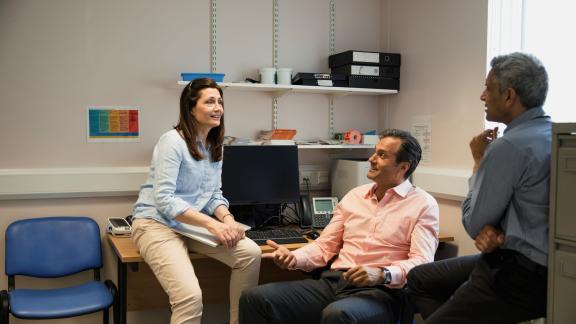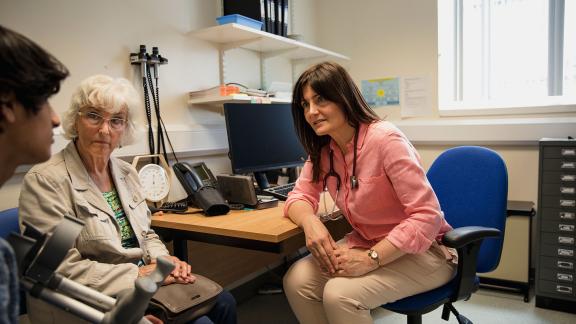Module five: Valued partnership within the ICS

Exploring the need to understand the purpose of an ICS, in order to develop an influential primary care voice within it.
The intention of ICSs is to bring the healthcare system closer to being truly focused on population health and reflective of local need. However, we argue that this will only be achieved with ongoing and meaningful engagement with primary care and adequate resourcing of primary care leadership.
In 2021, NHS Confederation Primary Care Network members set out the key requirements they wanted to see in the development of ICSs. These included collective voice and representation for primary care at system level; processes and structures for primary care at place level; system priorities that reflect local neighbourhood needs; systems that promote collaboration; and enablers that equip primary care for system working.
To be able to take up this role, primary care leaders need to expand their leadership approach from solely an organisational focus, to now also include systems thinking and the ability to see challenges from multiple perspectives, in order to build solutions and models of care that will last.
The role of the ICS and ICB
The leadership ask of PCNs is, therefore, to not only build a collective vision and operating model with their practices, but also support the building of a valued partnership with the integrated care board, sitting at the heart of an ICS. New models of care need to be integrated to support a future model as outlined by the Fuller stocktake and local systems need to have local autonomy.
As ICSs embed and move into the next stage of maturity, they will need to put collaborative working at the heart of their approach to build solutions that connect with current and future population need. The King’s Fund paper from 2022 states that:
‘Many of the greatest issues in health and care today – staffing shortages, long waiting lists, deepening health inequalities – require solutions that span many parts of the system.’
Through module five, primary care leaders explored the need to understand the purpose of an ICS, in order to develop an influential primary care voice within it. The mandated core purposes of an ICS are to:
- improve outcomes in population health and healthcare
- tackle inequalities in outcomes, experience, and access
- enhance productivity and value for money
- help the NHS to support broader social and economic development.
One participant reflected on the influential impact of framing PCN priorities or initiatives according to these:
“It's important to understand what (ICSs’) obligations are, so that when we do ask the questions or make the request for whatever we need, that we reframe, and thus have more chance of being listened to, and they take it on board and take more of an interest in the particular request or project.”
Working as part of the ICS and with the ICB
Giving time and thought to the question ‘what is the problem that the ICS is the solution to?’ helped participants to shift thinking. This was powerful because it helped leaders to think of themselves as part of the ICS, about how to approach and work with partners within the whole integrated system to underpin collaboration, including the voluntary sector and with the ICB itself, and the importance of keeping the patient at the heart of primary care services and delivery. One leader reflected:
“We are part of the system and we need to remember that and then enable the others to help.”
PCN leaders recognised that for some, there is a lack of understanding about what other partners do within the system. Gaining this understanding will help make the case for resources to be allocated to where resources are most needed. We talked about the ICB as an integrator and sharing its aim to resolve fragmentation within the patient journey, so that all partners work together, collaborating across health and social care. One leader remarked:
“One of the biggest things for me is that there are other people outside of our PCN and locality that are helping support a journey of travel, and one of the things is offering help from the PCN and letting the ICB know we’re available to support.”
Through the programme, PCN leaders explored the roles of the ICS in amplifying primary care’s contribution and advocating for primary care. By exploring the flow of information; working with ICB colleagues to explore ways in which the ICB has the potential to reinforce messaging for primary care and advocate for us; and also help to bring partners together to integrate healthcare; our primary care leaders were able to better understand the role of the ICB in working with stakeholders and bringing the system together to develop better solutions. One of our participants reflected on these roles using his own project:
“So I'm running housebound city vaccines at the moment. In order to make it easy for the ICB to support me in doing this outreach work, I have asked them how we can work together. Which agencies can we convene? We can work together to achieve our outcomes as well as the outcomes of the integrated care system.”
Opportunities in integration
Throughout the programme we reflected on how as complexity increases, the value and need of having data that integrates with our partner organisations does also. Great integration is supported by each component part of a system working at the best level for its function. PCN leaders on the programme explored what work is best done at what level in our system, ie what work is best done at practice, PCN, place and system levels. For PCNs, we identified this as utilising the ARRS staff, such as a social prescribing service across the PCN, giving our patients advice and support with the wider determinants of health. This requires collaboration and agreement to avoid duplication of effort or gaps in service provision.
Many of the PCN leaders felt that this course expanded their views and mindset and helped them create an increased sense of agency. It gave them the ability to affect change within the system that they are working with and within, particularly through the powerful opportunity of developing a collective primary care voice within a system. One participant stated:
“I think it made us all realise that we could use our networks. Really, we just need to be a bit braver.”
We need to create the environment for the right things to happen. If we have the right culture in our practices and PCNs, we are more open to new ideas and can effect change bottom-up. Connecting within and between our systems and regions to share best practice, and actively practising the culture change we need, will help us move forward. Exploring this through the lens of the collaboration continuum is helpful as it deepens our understanding of how to work with our own and other’s potential fear of losing of control. These situations need to be managed sensitively, and every person within each component part of the system needs to know that their contributions are valued and contributing to impact.
Primary care has an opportunity to shape our future. We are at the interface of a new approach and can bring in an integrated team and find a shared purpose. We can do this by aligning values and beliefs and understanding the power of relationships, rather than simply relying on structures.
Dr Rupa Joshi is a GP and clinical director for Wokingham North Primary Care Network and deputy chair of Berkshire West Primary Care Alliance; clinical adviser for NHS England’s Primary Care Transformation team; chair of the Workforce and Estates Design Group at NHS Confederation’s Primary Care Network; and clinical adviser for learning and development for the South East PCN Development Programme.
Louise Wheeler is the primary care leadership development consultant at the NHS Confederation.



